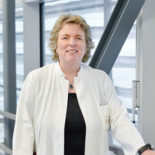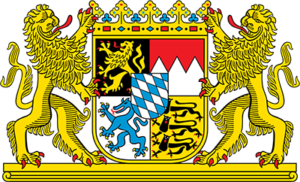Interview with Prof. Nadia Harbeck
»We take patients by the hand and lead them through the disease«
March 2017
© IZB
Video with Prof. Nadia Harbeck
Breast cancer is always life threatening and is one of the most common malignant diseases for women. Prof. Nadia Harbeck has made it her life’s work to find the best possible therapy for her patients. She heads the Breast Center of the University of Munich (Comprehensive Cancer Center CCC LMU) at two locations in Munich (LMU Department of OB&GYN at the downtown Maistrasse campus and the Grosshadern campus). In addition, she leads the interdisciplinary Tumor Board for Breast Cancer, where individual medical histories are discussed, and she also teaches as a professor of conservative oncology at the Ludwig Maximilians University. As the only German breast cancer expert, she is a member of all international guideline groups for breast cancer. As Scientific Director of the West German Study Group (WSG), she plays a decisive role in the design and execution of clinical trials for breast cancer patients. Susanne Simon and Rainer Rutz visited and interviewed Prof. Harbeck at the Breast Center.
im Dialog : Prof. Harbeck, your goal is to improve the everyday therapy of your patients. How do you manage this?
Prof . Harbeck : The best survival rates nowadays can only be achieved by accurate diagnosis, followed right from the start by high-quality interdisciplinary therapy concepts, taking tumor biology into consideration. This way, we can cure up to 70 or 80 percent of patients.
im Dialog : Who comes to your Breast Cancer Center?
Prof . Harbeck : Each year, we have an average of 700 to 800 new patients of all ages, also including pregnant women or men in about one percent of the primary diagnoses. Some are sent by their gynecologist or other cancer centers. Many search for information on the Internet and come to us directly for treatment or sometimes also to get a second opinion.
im Dialog : Can you briefly tell us about your professional career?
Prof . Harbeck : I worked for 19 years at the Dept. of OB&GYN at the Technical University of Munich, last as the head of conservative oncology. Then I was director of the Breast Center of the University of Cologne for three years. In 2011, I was appointed professor and head of the Breast Center at the University of Munich (LMU). Here in Munich, I introduced parallel structures at both breast center sites as well as new therapy concepts.

Head of Breast Center of the University of Munich (Comprehensive Cancer Center CCC LMU),
Leader of the Tumor Board for Breast Center,
Professor of conservative oncology at the
Ludwig Maximilians University (LMU)
© LMU
im Dialog: You are the only German expert in all international guideline groups for breast cancer and work in a leading position in one of the German breast cancer study groups. How do your patients benefit from your commitment?
Prof. Harbeck: As part of my work as Scientific Director of the West German Study Group (WSG) I am closely involved in the design of clinical trials for breast cancer patients. The aim of these trials is to develop therapy concepts that improve the chances for cure and therapy tolerability compared to current standard treatment. Our patients are very interested in participating in our clinical trials that we offer at the downtown Maistrasse campus and the Grosshadern campus. Since last year, we have also started to offer new therapy concepts such as immune therapies.
im Dialog: What makes the Breast Center of the University of Munich special?
Prof. Harbeck: We work with a motivated interdisciplinary team at the highest level and offer a comprehensive trial portfolio. The trend is towards individualized therapy, avoiding over- and under-treatment: here, the LMU Breast Center plays a leading role in the clinic, in research, and in teaching. In addition, the human component is enormously important. We literally take the patients by the hand and guide them through their disease.
im Dialog: To what extent do you work together with the Innovation and Start-up Center for Biotechnology?
Prof. Harbeck: We cooperate for example with Spherotec GmbH at the IZB that developed a method to find the optimal cancer drug for an individual tumor. This may have the potential of sparing unnecessary chemotherapies. Some of my colleagues have already carried out studies together with Dr. Barbara Mayer. I think that the start-up scene here in Munich is very exciting. Together with some colleagues, I have already developed an APP (CANKADO) to support therapy management and patient adherence.
„As the only German expert, Prof. Harbeck is in all international guideline groups for breast cancer.“
im Dialog: Prof. Harbeck, you have four children. How did you manage to combine your career and family so well?
Prof. Harbeck: The beginning was not easy. There was hardly any child care and no prolonged parental allowance. After studying photography in Canada, I studied medicine in Munich. My training as a specialist took eight years instead of five. But you simply have to take different paths. For example, since I had a small baby, I did my scientific work after the birth and gained my academic PhD qualification (Habilitation) as the first woman at Dept. of OB&GYN at the TU Munich. Previously, women in university medicine held no leadership positions. Most committees were exclusively male. Also at the Dept. of OB&GYN at the LMU Munich, I was the first female Professor to be appointed. My family has always supported me – for this I am very grateful. I would be happy if more women were to appy for leadership positions..
im Dialog: What will breast cancer therapy be like in 10 years?
Prof. Harbeck: With information from molecular tests, we will offer individualized and personalized therapies and probably less surgery of
the breast and axilla. Local therapy will always be part of an interdis-
ciplinary concept but the times of “first we’ll remove the tumor and then
we’ll worry about a therapy concept” will hopefully be long gone.




